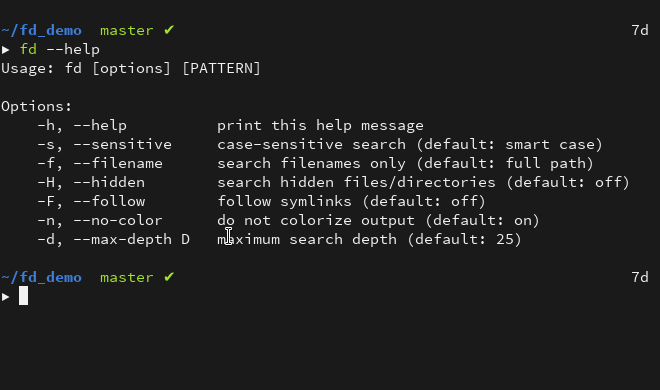|
|
||
|---|---|---|
| src | ||
| tests | ||
| .gitignore | ||
| .travis.yml | ||
| Cargo.lock | ||
| Cargo.toml | ||
| LICENSE | ||
| README.md | ||
README.md
fd
fd is a simple, fast and user-friendly alternative to find.
While it does not seek to mirror all of find's powerful functionality, it provides sensible (opinionated) defaults for 80% of the use cases.
Features
- Convenient syntax:
fd PATTERNinstead offind -iname '*PATTERN*'. - Smart case: the search is case-insensitive by default. It switches to case-sensitive if the pattern contains an uppercase character*.
- Colorized terminal output (similar to ls).
- Ignores hidden directories and files, by default.
- Ignores patterns from your
.gitignore, by default. - Regular expressions.
- Unicode-awareness.
- The command name is 50% shorter* than
find:-).
Demo
Colorized output
fd can colorize files by extension, just like ls. In order for this to work, the environment
variable LS_COLORS has to be set. Typically, the value
of this variable is set by the dircolors command which provides a convenient configuration format
to define colors for different file formats.
On most distributions, LS_COLORS should be set already. If you are looking for alternative, more
complete (and more colorful) variants, see
here or
here.
Benchmark
A search in my home folder with ~150.000 subdirectories and ~1M files. The given options for
fd are needed for a fair comparison (otherwise fd is even faster by a factor of 5 because it
does not have to search hidden and ignored paths):
benchmarking bench/fd --hidden --no-ignore --full-path '.*[0-9]\.jpg$' ~
time 2.800 s (2.722 s .. 2.895 s)
1.000 R² (1.000 R² .. 1.000 R²)
mean 2.821 s (2.810 s .. 2.831 s)
std dev 16.52 ms (0.0 s .. 17.02 ms)
variance introduced by outliers: 19% (moderately inflated)
benchmarking bench/find ~ -iregex '.*[0-9]\.jpg$'
time 5.593 s (5.412 s .. 5.798 s)
1.000 R² (0.999 R² .. 1.000 R²)
mean 5.542 s (5.502 s .. 5.567 s)
std dev 37.32 ms (0.0 s .. 42.77 ms)
variance introduced by outliers: 19% (moderately inflated)
(benchmarking tool: bench)
Both tools found the exact same 14030 files. Note that we have used the -iregex option for find
in order for both tools to perform a regular expression search. Both tools are comparably fast if
-iname '*[0-9].jpg' is used for find.
Concerning fd's speed, the main credit goes to the regex and ignore crates that are also used in ripgrep (check it out!).
Install
With Rust's package manager cargo, you can clone, build and install fd with a single command:
cargo install --git https://github.com/sharkdp/fd
Note that rust version 1.16.0 or later is required. The release page of this repository also includes precompiled binaries for Linux.
On OS X, you can use homebrew:
brew install fd
On Arch Linux, you can install the AUR package fd-rs-git via yaourt, or manually:
git clone https://aur.archlinux.org/fd-rs-git.git
cd fd-rs-git
makepkg -si
Development
cargo build --release
